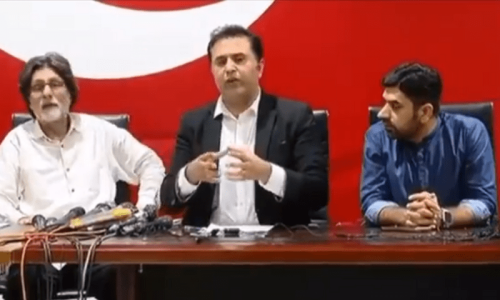It’s an old saying: that hard cases make for bad law. When the facts are extreme, judges have little choice but to lead with head and heart.
How tragic is it, then, when easy cases make for bad law; where the facts are obvious, and the text already decided by far larger benches (11 and 12 judges in the twin Benazir Bhutto decisions)?
That’s what happened last January: few verdicts in recent memory have been more ludicrous in reasoning, more corrosive in outcome, and more damaging for democracy than the bat symbol ruling, stripping the country’s largest party of its electoral sign right before polls.
Yet even here, the Pakistani voter shocked the system: despite disenfranchisement before and rigging after, the party won a plurality. In the months since, however, that same judgement remains a rolling disaster: parliament is paralysed, reserved seats are up in the air, and a full bench of the Supreme Court picks through the mess.
Consider the chaos: with its bat broken, the PTI fell foul of Rule 94 of the Election Rules — parties are entitled to reserved seats only if allotted a symbol. It’s why PTI-backed independents veered far right to join the Sunni Ittehad Council (symbol: ghora).
But then the ECP sprung a second trap: the Election Act requires parties to submit candidate lists to the ECP before polling if they want reserved seats. The Sunni Ittehad has a symbol, but no list, just as the PTI has a list, but no symbol.
Few verdicts in recent memory have been more corrosive.
If all this sounds like legal jiggery-pokery to suppress the will of the people, that’s because it is. First, a party doesn’t dissolve into the ether just because its symbol is taken: by dint of the millions of votes they draw, elected representatives cannot be denied their rightful strength in the assembly.
Second, the supreme law remains Article 51(6)(d) and (e) of the Constitution, which says general seats against which reserved seats are distributed ‘include’ independents who join a party post-election.
Third, we know this holds true because the ECP handed the Balochistan Awami Party a reserved seat in 2019 without the latter contesting provincial polls in the ex-tribal areas or submitting a list. The ECP has since shrugged it was wrong then but correct now.
Fourth, does form defeat substance? While hearing the case, the chief justice said, “…I do subscribe to the literal interpretation of the Constitution theory.”
If CJ Qazi Faez Isa is a literalist, it’s a recent development. When overturning lifetime disqualification, he erased Article 62(1)(f), saying the provision was ‘non-self-executory’ — and didn’t mean what it plainly said: that a court of law could declare an electoral candidate dishonest. His decision didn’t reinterpret 62(1)(f); it deleted it outright.
Then, as journalist Hasnaat Malik pointed out, it was his Lordship that had challenged the PTI sarkar’s reference against him in the Supreme Judicial Council. This was despite Article 211, which bars council proceedings being taken up by the Supreme Court. The matter was not only taken up, the council was knocked aside.
Further back, his early stance on military trials of civilians was the least literalist of all: that Article 239 — which says no constitutional amendment can be questioned by any court — didn’t stand in his way, and that parliament didn’t have unlimited authority to change the Constitution.
Even in criminal cases with less room for interpretation, literalism was let go: in 2017, Justice Isa held that though the Penal Code stated that pardoning murder had the effect of an acquittal, this was still “different from an acquittal”. Another bench disagreed: pointing to the plain text, Justice Asif Saeed Khosa sighed that judges apply law “as it exists”, and not “pious wishes”.
None of this is to say whether these positions were right or wrong; it’s to say literalism was nowhere on the scene when arriving at them.
But even going by the literal school, not a single line of text in the law or Constitution allows divvying up a winner’s reserved seats to the loser, nor denies them to a party that hasn’t contested.
Interestingly, the fight for reserved seats has an old and explosive history here. In his doomed stand for Indian unity in Calcutta in 1928, Jinnah staked his future on a core demand: one-third reserved seats for Muslims in the assembly; the far less popular Hindu Mahasabha sneered at him instead. A heartbroken Quaid told friend Jamshed Nusserwanjee, “This is the parting of the ways”; the first time Jamshed saw him weep. Pakistan was born less than two decades later.
Nearly a century since, the betrayal of reserved seats not only concerns minority representation, but the fate of democracy itself. Whatever the outcome, the Jan 13 dilemma is back: here’s another easy case, one that shouldn’t make for hard law.
May history see the Supreme Court through.
The writer is a barrister.
Published in Dawn, July 6th, 2024















































Dear visitor, the comments section is undergoing an overhaul and will return soon.